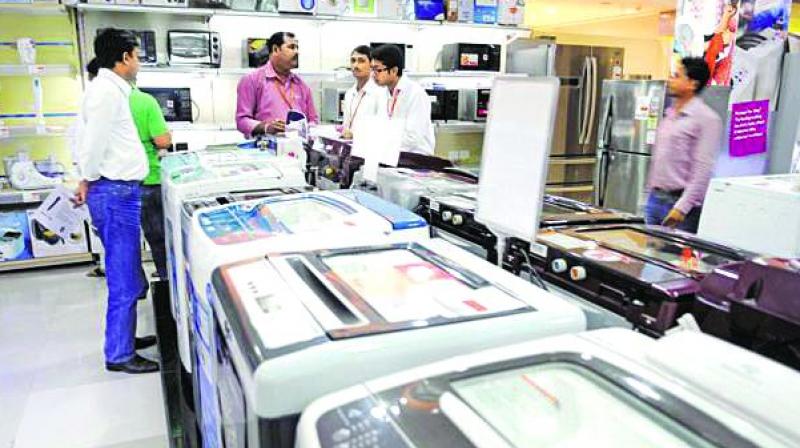Imports of consumer durables soar in FY19

Chennai: Despite all the noise government has been making around ‘Make in India’, imports of consumer durables have significantly risen in FY19 and are several times higher than exports. The increase in import duties on Chinese goods last year has not helped much, as the free trade agreements with a few countries is still marring domestic production.
As per the DIPP data, imports of refrigerators are 150 per cent higher than exports. In FY19, the country imported Rs 3,919.71 crore worth refrigerators against exports of Rs 1,568.47 crore. While the imports went up from Rs 3,497 crore in FY18 to Rs 3,919 crore in FY19, the exports declined from Rs 1,578 crore to Rs 1,568 crore.
The situation is not different for other durables. India’s imports of washing machines and laundry machines are 484 per cent higher than exports. In 2018-19, the country imported Rs 1,670.78 crore worth machines against exports of Rs 286.24 crore. While the imports went up 33 per cent from Rs 1,258 crore in FY18 to Rs 1,670 crore in FY19, exports dipped 10 per cent from Rs 320 crore to Rs 286 crore in one year’s time.
In the case of air conditioners, even production in the organised sector came down from 38.08 lakh units to 35.23 lakh units in FY19. The imports worth Rs 8,343 crore were 624 per cent higher than exports worth Rs 1,152 crore. Imports went up from Rs 7,495 crore in FY18 to Rs 8,343 crore in FY19.
Last year, India had doubled import duty on a few Chinese products, including air-conditioners, refrigerators and washing mach-ines, from 10 to 20 per cent.
“The duty hike happened in September and by then most of the imports for festive sales had been made. Hence, the impact of duty hike did not reflect on the import figures. However, we hope that there would be a decline in FY20. We believe that th duty hike will support ‘Make in India’,” said Kamal Nandi, President, Consumer Electronics and Appli-ances Manufacturers Association.
However, Chinese products are still finding an easy way into the market through countries like Thailand with which India has a free trade agreement.
According to Eric Braganza, President, Haier Appliances India, the free trade agreements signed by India with some of the countries, including the ASEAN block, have brought down duties on finished products to nil, whereas import of components still attract duties. Due to this inverted duty structure, several companies produce durables in these countries and import them into India. “Imports have increased in mid- to high-end products. When cheaper imported goods are available, there is no incentive to pay duties for different components and make it in India. Traders also find the zero duty products cheaper than domestically manufactured products,’ he said.
Naval Seth of Emkay Global feels the foray of Voltas-Beko, a joint venture between Voltas and Turkish company Arcelik, into the market also would have contributed to the increase in imports. With the Gujarat facility not yet set up, the company is importing products from its facility in Thailand. The JV is aggressively pursuing a target of Rs 10,000-crore turnover and 10 per cent market share by 2025.
“We have asked the government to choose consumption-based countries and not manufacturing-based countries while signing FTA. FTA agreements with consumption-based countries will boost our manufacturing industry,’ said Nandi.

